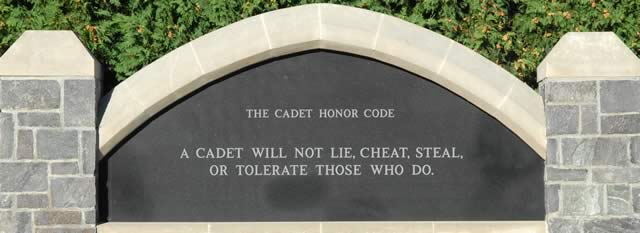For most of our life, we’ve heard, “Don’t be a snitch”. In most of the movies we’ve seen, the “snitchers’ don’t fare so well when their comrades discover their double-dealing. D oes this same approach work in organizations?
What do they do at West Point?
This is part of our continuing series on conduct and behavior inside organizations. Last week, we talked about “conduct unbecoming”, another phrase related to military culture. This week we turn to the stricter Cadet Honor Code and what’s occurred during the COVID Pandemic.
Some of you may be familiar with the famed but controversial West Point Cadet Honor Code:
“A cadet will not lie, cheat or steal or tolerate those who do.”
Few of us would doubt the wisdom of “will not lie, cheat or steal”, the core of many of the values we learned as children.
One of the other things we learned as children, though, was, “don’t be a tattletale.”
Be loyal to your friends … don’t snitch on them … and don’t go running to mommy when you observe a small infraction of the rules.
It doesn’t help we’ve seen countless movies since then where a snitch ends up on the wrong side of the grass.
What About the Part,
“or tolerate those who do”?
You should begin to see how this relates to the subject of “conduct unbecoming,” which we discussed in How Close is Your Business to a Colossal Screwup?. It’s a mighty high standard of conduct expected from military officers and gentlemen.
This is Part 2 of a 2 part series related to acceptable behavior and conduct in organizations. Part 1 is How Close is Your Business to a Colossal Screwup?
In some ways, “conduct unbecoming” is an easier standard to meet because it focuses on conduct that you can control … your own!
But, it’s an even higher expectation that you will refuse to tolerate such behavior in others.
Are We Supposed to Report Every Minor Infraction?
What does this mean exactly?
Does it mean we’re obligated to report every single infraction we observe regardless of the consequences, to others or us?
How does that square with our childhood belief that “telling on our friends” is the worst of all sins?
There are Few Excuses for Stealing ….
Stealing is a recognizable offense, and bears few excuses or apologies.
But, what do we do if we “heard” that Johnny stole our friend’s bicycle?
Is that enough to report it, even though there’s absolutely no corroboration of the story?
What if we’re pretty sure it was Johnny because we know he’s grabbed other kids’ bikes in the past?
Do we report it then?
What if Susie says she thought she saw Johnny with the bike? Is that enough?
How much do we “tolerate” before it’s time to cough up our story?
Cheating & Lying Gets a Little Trickier ….
While reporting thievery can get a bit messy, what about instances of cheating and lying (which is the area where the occasional West Point cadet scandals have occurred over its more than 200 year history?)
I imagine all of us have witnessed a fellow student cheating on an exam, whether he had an answer written on his hand, or she had tucked a small piece of notepaper somewhere and glanced at it occasionally.
I also imagine that most of the time, we didn’t report it, figuring it was his loss not ours, and it wasn’t our place to report him.
Likewise we’ve probably sat still while a friend of ours told a lie, comforting ourselves with the notion that he wasn’t really lying, just “stretching the truth” slightly, or telling a “white lie” … just an insignificant “fib” … or maybe leaving out part of the story because no one asked.
Most likely, we figure it’s “none of our business” – “he’s lying, not me” – so why I should I stir things up?
A New Cheating Scandal at West Point
Recently, the U.S. Military Academy at West Point concluded an investigation into the largest cheating scandal in 40 years. (This article may require a subscription, but go ahead and give it a try.) It found that dozens of cadets had cheated on an exam while studying remotely during the pandemic.
One of the results of this is a finding that the West Point policy of a “willful admission process” will be ended. That policy was intended to protect a cadet from expulsion if he or she admitted to wrongdoing. It was put in place in 2015 to encourage self-reporting among cadets without fear of expulsion so they would be more likely to confront peers about honor violations.
Zero Tolerance to Tolerance …and Back to Zero Tolerance
Here’s the question:
Should offenders of a Code of Conduct be given a second chance … or is a No Tolerance policy the correct approach, accepting no infractions whatever?
Some argue that the Honor Code, perhaps like the Code of Conduct in your organization, is all about character and there is no room for error or forgiveness.
Others think that organzations should embrace an approach to “development” and that giving a second chance to the remorseful is preferred over allowing one mistake to end a career.
Can You Accept the High Standard that Rejects a Double Standard?
The notion of the West Point credo is to avoid the double standard of justice, where the rules apply to one person and not the other.
It is an effort to establish a very high standard of ethical behavior that accepts no less from others than is demanded from us.
In spirit, it reflects the kind of values we are all proud to uphold, in others, and ourselves but it does pluck the strings of our childhood dilemmas about being a tattletale.
“Is there Zero Tolerance in your organization … or do your teammates get a Second Chance?” ~Lary Kirchenbauer Click to Tweet
What does your organization expect?
Where do these issues fall in the pantheon of values and behaviors that your organization demands?
What do you expect of others when they observe inappropriate or unethical behavior? Should it be tolerated?
Do you simply hope they will take action or have you made your expectations clear to everyone?
Perhaps this is a good time to consider your standpoint on such issues.
You can be sure someone is watching.
Question: What do you expect of others when they observe inappropriate or unethical behavior? Should it be tolerated? Should they be given a second chance?
How would you answer that? Let me know and we’ll build on that to expand our discussion of these ideas and concepts. If you’re active there, you can connect with me on LinkedIn. You can also find me on our Building a Business page on Facebook or on Twitter.



